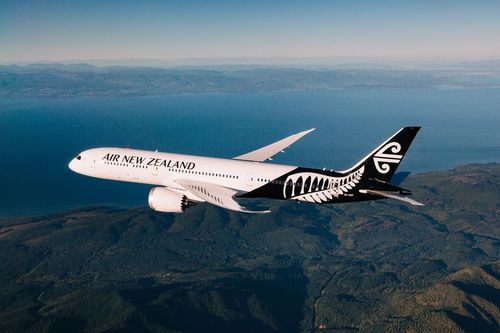Air New Zealand purchases 30 million liters of SAF

SOURCE: Air New Zealand
December 19, 2024
BY Air New Zealand
Air New Zealand on Dec. 18 announced its largest purchase of sustainable aviation fuel (SAF) to date, securing more than 30 million liters from Neste to be uplifted from Los Angeles and San Francisco through to February 2026.
This volume of SAF will deliver up to an 80% reduction in carbon emissions across its lifecycle compared with jet fuel made from fossil fuels. This SAF is manufactured by Neste in Singapore from 100% renewable waste and residue raw materials such as animal fat waste and used cooking oil.
Air New Zealand's Chief Sustainability and Corporate Affairs Officer, Kiri Hannifin says this purchase represents 1.6% of the airline's total fuel supply for FY25 will be SAF, meaning the airline will reach its SAF target for the year – more than four times the volume of SAF the airline used in FY24.
"1.6% is still a very small proportion of our total fuel use, but it's four times more than we carried last year, so I am thrilled with the trajectory. Like all airlines, we urgently need to move away from our high reliance on fossil fuels as quickly as we can. Securing year-on-year higher volumes of SAF is critical."
"Momentum around SAF policy and production continues globally, with airlines, governments, airports, and fuel companies moving towards alternative fuels at an increasing pace, particularly in the Asia-Pacific region, which is incredibly gratifying for a South Pacific airline like us.
Advertisement
"While we are doing what we can at a global and industry level, we also need supporting SAF policy in New Zealand which may also pave the way for domestic production. We are seeing more and more governments overseas moving to enact low-carbon aviation policies to support their economies, so we'd love to see similar support here to ensure New Zealand isn't left behind in the move to lower emissions fuels."
"As an airline, we are targeting using 10% SAF by 2030. We've invested in two feasibility studies to understand if New Zealand production from feedstocks like woody biomass could become a reality and we are delighted that it can be. We're pulling every lever available to us because sitting on our hands is not an option. The climate crisis is worsening, and we are responsible for changing the course of action to protect our natural environment for future generations".
Neste's Vice President Renewable Aviation Business, Alexander Kueper says: "We are proud to support Air New Zealand's efforts to increase their usage of SAF as a key lever to reduce aviation emissions. This supply of our Neste MY Sustainable Aviation Fuel at Los Angeles and San Francisco airports is another great step in our cooperation and we are looking forward to continuing working together with Air New Zealand to reach their climate goals."
The International Air Transport Association (IATA) recently announced that in 2024, SAF production volumes reached 1.3 billion litres, double the 600 million litres produced in 2023. SAF accounted for 0.3% of global jet fuel production and 11% of global renewable fuel*. This is significantly below previous estimates that projected SAF production in 2024 at 1.9 billion litres as key SAF production facilities in the US have pushed their production ramp-up to the first half of 2025.
Advertisement
Editors Notes
• *Sustainable Aviation Fuel is an alternative jet fuel commonly referred to as SAF. It releases the same amount of carbon as regular jet fuel when burnt in an aircraft engine, but has lower lifecycle carbon emissions because it is made from materials other than fossil fuels, such as used cooking oil, household waste or forestry waste. SAF is usually mixed with conventional jet fuel as part of the overall fuel mix that powers an aircraft. It is certified and safe to use by airlines now.
• SAF is the biggest lever available for aviation decarbonisation. Global scenarios suggest 70-100% SAF will be needed by 2050 for governments to meet their collective goal of net zero emissions from international aviation by 2050.
• Sustainable aviation fuel is derived from renewable sources such as plant oils, waste oils, agricultural residues, municipal solid waste, and woody biomass – it reduces greenhouse gas emissions by up to 80%* over the fuel's life cycle, compared to using conventional jet fuel.
• The reduction of lifecycle carbon emissions of up to 80% referred to above is when SAF is used in neat form (i.e. unblended) and calculated with established life cycle assessment (LCA) methodologies, such as the global Carbon Offsetting and Reduction Scheme for International Aviation (CORSIA) methodology.
Related Stories
NREL announced the findings of the Assessment of BQ-9000 Biodiesel Properties for 2024, the eighth in a series of annual reports documenting the quality of biodiesel from U.S. and Canadian producers participating in the BQ-9000 program.
Kintetsu World Express Inc. has entered into a new agreement with Shell Aviation regarding the use of SAF. Under this agreement, KWE will adopt Shell Aviation's digital platform "Avelia" to swiftly address shippers' low-carbon transportation needs.
The U.S. EIA increased its forecast for 2026 renewable diesel production in its latest Short-Term Energy Outlook, released Aug. 12. The 2026 forecast for SAF production was lowered, but the outlook for biodiesel production was maintained.
Aemetis Inc. released Q2 results, reporting increase revenue when compared to Q1. During an earnings call, company officials detailed progress with the company’s RNG, ethanol, biodiesel, SAF and carbon CCS projects.
Calumet Inc. on Aug. 8 confirmed its Montana Renewables biorefinery is currently running at full capacity. An initial phase of the company’s MaxSAF initiative remains on track to boost SAF capacity to up to 150 MMgy by mid-2026.
Upcoming Events










